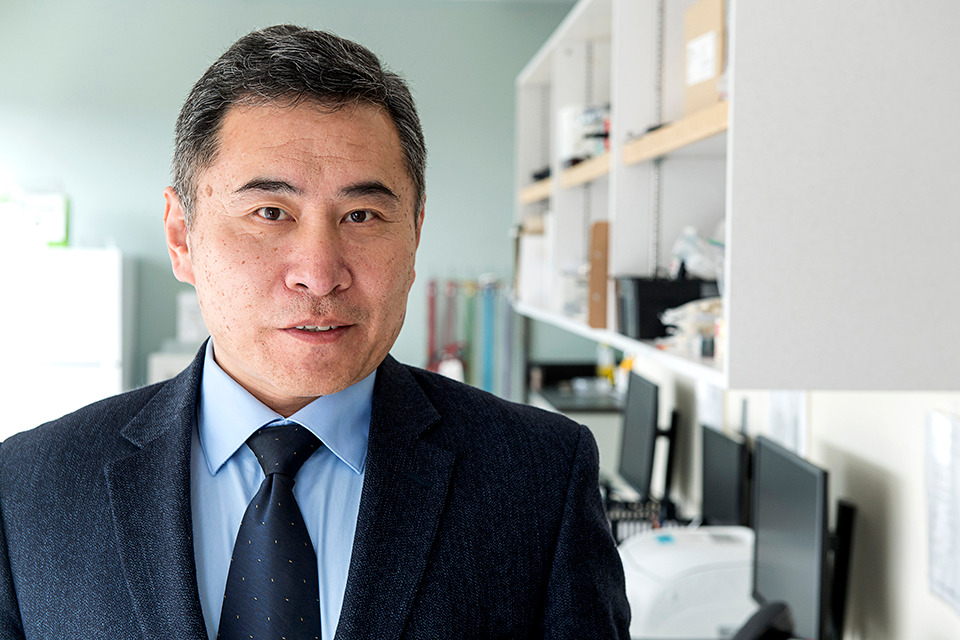The Exploration stream of the New Frontiers in Research Fund (NFRF) has granted a total of $1.5M to six researchers from the Faculty of Medicine and affiliated institutes to support their innovative, high-risk high-reward research projects.
Administered by Canada’s three federal research agencies, the NFRF program seeks to assist research teams that use novel interdisciplinary approaches that could lead to significant social, economic, scientific, artistic, or cultural breakthroughs.
Congratulations!
Vanessa D’Costa
The majority of targeted cancer therapy drugs are small molecules. While successful for short-term treatments, these therapeutics are very susceptible to the development of drug resistance, which ultimately causes treatment failure. To address this problem, Vanessa D’Costa and her team are developing treatments that combine the use of bacterial toxins, called effectors, with cutting-edge nanoparticle drug delivery methods. Their goal is to find urgently needed therapeutic tools to treat triple negative breast cancer, which accounts for most breast cancer-related deaths.
Amount: $250,000
Institution Paid: University of Ottawa
Patrick Giguère
Canada is facing a national public health emergency as the result of the growing number of overdoses and deaths caused by the misuse of opioids, including fentanyl, which are widely used to treat pain and addiction disorders. To tackle the national opioid crisis, Patrick Giguère and his research team are exploring the development of hybrid analgesics as safer alternatives for use in pain management and addiction treatment. Building on a recent genetic discovery, Giguère, in collaboration with André Beauchemin of the Department of Chemistry, is aiming to design small-molecule drugs that would combine the inhibition of a pain sensation gene with very low opioid dosages to produce dramatic pain relief without life-threatening effects.
Amount: $250,000
Institution Paid: University of Ottawa
Baptiste Lacoste
Brain development is affected in autism spectrum disorders (ASD), which are conditions characterized by developmental delay, intellectual disability, and higher rates of metabolic disorders. While neuronal deficits are commonly associated with ASD, vascular problems occurring at an early age also affect brain maturation. However, the link between vascular deficits and ASD remains unclear. Baptiste Lacoste’s research project will focus on cellular and molecular mechanisms underlying neuro-vascular deficiencies in ASD. His multidisciplinary team of experts will work on providing a link between neuro-vascular interactions, neuronal maturation, and metabolic regulation in ASD, thus opening new doors for autism research.
Amount: $250,000
Institution Paid: Ottawa Hospital Research Institute
Marc-André Langlois
Since one in two people develop Alzheimer’s disease (AD) by the age of 85, early symptom detection is vital so that patients can start drug therapy early enough to delay the disease’s progression. Marc-André Langlois and his multidisciplinary research team aim to design a new, highly sensitive way to detect AD at its earliest stages by combining cutting-edge small particle analysis technology, machine learning and expertise in virology, kidney research, and antibody engineering. Langlois’ goal is to analyze markers on the surface of extracellular vesicles — small particles used by cells to communicate — which are released by damaged neuronal cells into the cerebral spinal fluid of AD patients to identify patterns that will facilitate early AD diagnosis.
Amount: $250,000
Institution Paid: University of Ottawa
JianLi Wang
Suicide is influenced by many factors, including individual health, available healthcare systems, and neighbourhood and communities. JianLi Wang’s research project focuses on improving our capability to prevent suicide at the population and health system levels by developing the first multivariable risk predictive algorithms for suicide. Linking vital health statistics from national and provincial data, Wang will provide an innovative set of risk predictive tools to assist policy and decision-makers in proactively preventing suicide and effectively mobilizing mental health resources.
Amount: $250,000
Institution Paid: The Royal’s Institute of Mental Health Research
Xiaohui Zha
Early detection of neuronal dysfunction in diseases such as Alzheimer’s and Parkinson’s is essential for effective intervention. Xiaohui Zha’s proposal aims to develop non-invasive methods for early detection of neuronal disease. In collaboration with Xiaoyi Bao of the Department of Physics and Michael Schlossmacher of the Ottawa Hospital Research Institute, Zha will work with a multidisciplinary team of experts in optical fibre, disease biology, and clinical neurology to develop proof-of-concept methods.They will apply advanced optical fibre techniques to non-invasively assess the fitness of neuronal cells in animals to help detect neuronal diseases at early stages. Zha’s research will contribute to the development of therapies to stimulate neuronal recovery.
Amount: $250,000
Institution Paid: Ottawa Hospital Research Institute
Read more:
Trailblazing interdisciplinary research projects receive $3M to explore uncharted territory
From left to right: Dr. Marc-André Langlois; Dr. Vanessa D'Costa; Dr. Patrick Giguère



